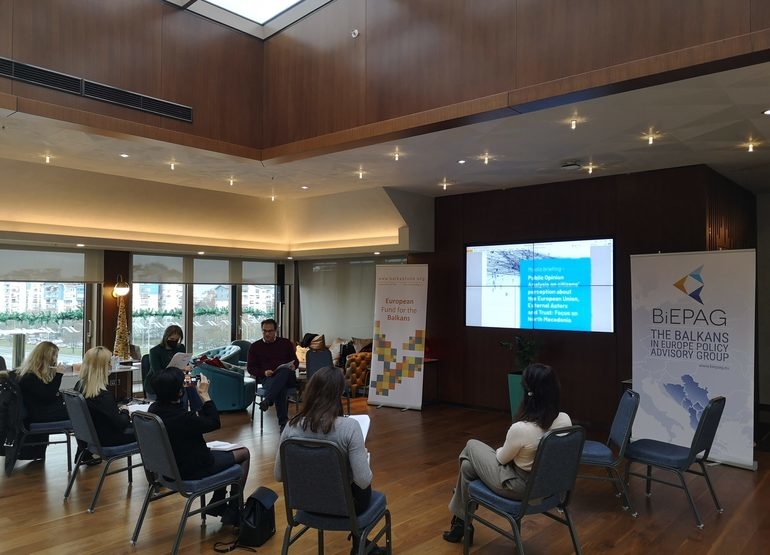
The European Fund for the Balkans (EFB) organized a closed media event and a briefing with the journalists in order to present the main takeaways from the “Public Opinion Survey on EU, External Actors and Citizens' Trust: The Perspective of Northern Macedonia”.
The event which was held on Monday, December 13th in Skopje, gathered a selected number of media representatives who were presented with more detailed information about the latest data from the public opinion poll conducted by Ipsos Strategic Marketing, and commissioned by EFB.
The primary data were collected in the course of July and August 2021 in all countries in the region, with a set of questions focused on three key topics - Trust, External actors and EU Integrations.
In her introduction, the Executive Director of the Fund, Aleksandra Tomanić briefly addressed the regional perspectives in the work of the Fund, as well as its "Balkan Policy Advisory Group in Europe" (BiEPAG), and Zoran Necev, member of BIEPAG and Head of the Center for EU Integration in IDSC Skopje presented the overview of Northern Macedonia and the main messages from the latest BiEPAG's analyses based on this comprehensive survey.
The findings show that the respondents from North Macedonia perceive Serbia’s assistance during the Covid19 pandemic as the biggest among the given options. More than half of the respondents’ (52%) primary choice is Serbia, whereas the EU comes second with a low percentage (16%), compared to Serbia, placing it at only 1% above China. Just after, Russia stands at 11%.
The high support for Serbia comes as a surprise as even other Western Balkan countries with significant Serbian ethnic presence rank Serbia’s support as lower, such as Bosnia and Herzegovina (44%), and Montenegro (31%).
When it comes to providing assistance to North Macedonia since the start of the Covid19 pandemic, the timing, rather than the actual quantity, was crucial for shaping the citizens’ perception. Serbia opened its vaccination points for Macedonian citizens early in the pandemic and was the first country to donate vaccines (Pfizer) to North Macedonia.
Besides the perceived help, the survey also looks at the positive and negative influence of different countries/blocks on North Macedonia (not limited to the pandemic). This again depicts an ambivalent and fissured picture. While the gulf countries receive the least support, the US, China, the EU and Russia all seemingly have their fans and foes. Remarkably, 49% of respondents assess the influence of Turkey as “very positive” and only 10% consider the country’s influence as “very negative”. Right after Turkey, the EU enjoys 41% of positive responses compared to 21% who assess its impact as negative - only 4 percentage points ahead of Russia (37%).
More info on this part of the survey is available at the following link.






